Blackout 2003 – The Recap
Blackout 2003 ñ The Recap
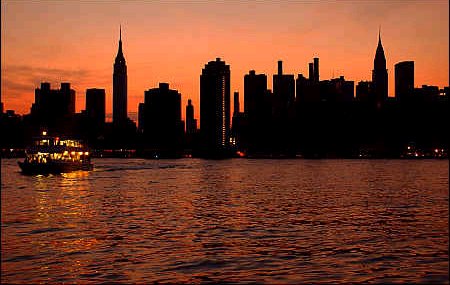
The sun set on the city on Thursday, and New Yorkers settled in for the night. It was a night of calm, of peace, and of consideration. Courtesy ruled the roost. New Yorkers dealt with the problem, and made do. In other times, in other years, it might have been a different story. But in 2003, it was just an inconvenience, and fodder for years of stories to be told, ìWhere were you when the lights went out in 2003?î
This was one of the headline stories in Saturdayís NY Daily News:

You can see the full story here.
For news of the city, the five boroughs, the immediately outlying area, the Daily News is the paper to read in NY. The Times has the foothold on National and International. The Times and the News (as well as some of the regional suburban papers) duke it out for caliber of state coverage, mostly Albany doings for both. The Post takes the cake for sex, lies, and word games. Then thereís that daily that came out sometime in the last year. It may or may not still be alive. One would never know.
The News has excellent post-mortem coverage of the Blackout. Some of the articles:
The Front Page lede: Weíve Got The Power! The city returns to normal.
Experts Know Zip Over Zap. Theories and the lack of certainty over what happened.
Getting Back On Track. The subways are running again.
Summer Camp For Tourists. The stranded tourists, as well as those unable to get home, managing to camp out, cope, and deal with it.
A Rotten Turn of Events FOOD! What to do?!? Restaurants gave it away, homeowners had cookouts, apartment dwellers had open houses and block parties. Spoiled food, or food about to spoil, had to be dealt with, one way or another.
We Sweat It Out, Waiting For Light. Neighborhood by neighborhood, work zone by work zone, the lights and the power come back.
Itís A Slo-Mo City. Friday as a bonus day off, a bike ride to work, or just a day of rest after the arduous walk or trudge back home after the power went out.
From a dark womb into a dark room! You just knew there would be stories such as this! Nearly 100 babies were born during the outage. These will be some of the more memorable births talked about in years to come among the families.
Sad to say, The Timesí coverage of the blackout just doesnít hold a candle to that of The News.
Yes, I really wrote that: hold a candle!
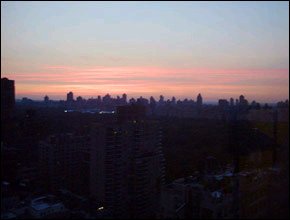
More Blackout factoids:
- 9,500 police officers were out in New York overnight, up from the usual 1,000 to 2,000
CNN reported that the Crime rate in New York City was lower than the norm on Thursday and Friday. Another examples of New Yorkers acting responsibly. Not the animal-like reaction some recall from 1977.
More from CNN: 800 elevator rescues; 80,000 calls to 911; a record 5,000 emergency medical service calls; 60 serious blazes and 11 burglaries in New York City.
The temperature was 92 degrees Fahrenheit in New York City when the blackout occurred.
MSNBC: From Slate The Missing Looters
From the article:
In New York City last night, street life was not a fearful tableau of pandemonium but a convivial scene of neighbors and strangers sharing candlelight, radio news, and small talk.
Also from MSNBC: An article by Brian Meeks, positing that the Power Outage may well just have served as a terrorism ëdry runí scenario. In other quarters there has been speculation that this was just a preliminary move, a taking of the temperature, so to speak. From Meeksí article:
Asked what was going through his mind at such images, the counterterrorism source said only: ìTargets.î
Itís not hard to imagine terrorists rewriting their playbooks after watching the events of Thursday. ìThis is a dry run for what might happen if another terrorist incident hits,î said Steve Emerson, terrorism expert and NBC analyst.
The scenario could play out as a ìone-two punch,î Emerson said, in which a catastrophic power outage is coupled with a brutal attack on people massing in open areas with nowhere to go. ìAl-Qaida couldnít get better on-the-job training,î Emerson said, than by watching Thursdayís events play out in real time. ìTheyíre looking at it, seeing now that itís possible,î he said.
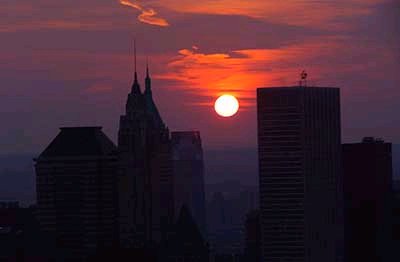
ABC News: The Terror Question ñ No Signs of Deliberate Attack in Blowout, But Possibility Not Ruled Out.
ABC, like NBC, has a consultant who is also not so quick to deny any terror link in the blackout.
Anybody who says that they know what happened last night is lying," said Dick Clarke, an ABCNEWS consultant and former National Coordinator for Security, Infrastructure, and Counterterrorism.
"If it were a cyber-attack, you wouldn't know right away," added Clarke. "And you might never know."
Clarke said a series of simulated computer attacks on electric power grids four years ago were almost all successful, showing the vulnerability of the system.
Ironically, utility companies had just agreed on cyber-security rules days ago, said Clarke, although they had not implemented them yet.
Over the past two years, there have been numerous instances of what law enforcement officials called "credible intrusion events" in computers into the electric grid system.
In one, during the spring of 2001, the FBI detected hackers routed through China who were trying to invade the power grid in Florida. The sophistication of the hacker attack deeply concerned law enforcement officials, and new safety standards were implemented in response to the problem.
ABC News also carried the AP Report with an excellent timeline of the events associated with, and as a result of, the Blackout.
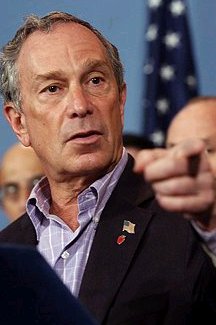
NYC Mayor Michael Bloomberg
In The NY Times there is a good article by Martin Gottlieb: In Calm Blackout, Views of Remade City. The article discusses the difference between the looting and chaos of the Blackout of Summer of 77 versus the relative calm, almost convivial, if not in some areas, festive, mood of the Blackout of 2003. It is a different city, 26 years later.
From Gottliebís article:
Thus, the near lack of untoward incidents during this blackout may reflect a lot.
"We have worked over the years to build an infrastructure to protect this city, and provide services," Mayor Michael R. Bloomberg said on his weekly radio program Friday morning. "Most of the time most of the things really do work, and that's why last night will go down as a safe night in New York City, a night where people got along."Compared to 1977, he said, "I think you can make the case that people in New York City are happier, get along better, cooperate with one another."
Those sentiments are widely shared, and for no small reason. The decade of the 70's was the time of the city's greatest population loss ó "the arch decade of white flight," in the words of John H. Mollenkopf, director of the Center for Urban Research at the City University Graduate Center, and also the first decade in which black and Puerto Rican middle-class families left the city along with whites. A poll taken by The New York Times and CBS News just after the '77 blackout yielded this headline: "Nationwide Poll Finds 6% Think New York Is a Good Place to Live."
Although Gottliebís article does not go into it in great detail, it was also very interesting to watch the manner and method of Mayor Bloomberg, as opposed to his immediate predecessor, the vaunted and beatified Rudy Giuliani.
Many credit the return of the city, in particular, the restoration of Quality of Life in the city, to Giuliani. No question the city became a better place under Giuliani, but then again, this was the man who followed David Dinkins into office. The city was a disaster area under Dinkins. Had Dinkins been mayor during a Blackout, one would suspect that Al Sharpton would be heading a commission immediately thereafter, on why Con Edison targeted minorities in the outage. If nothing else, Giuliani restored sanity to the city.
Then came September 11th, and Giuliani handled it with Èlan, grace, and he truly shone in what turned out to be his defining moment. In a time of crisis, he was the right man for the job.
During the Blackout Bloombergís first crisis situation of so grand a scale, he performed admirably. He was available to reporters, he was constantly providing updates, he was on the generator-powered airwaves on a regular basis.
Bloombergís flat toned, reassuring voice was full of good old fatherly advice: ì . . .drink fluids, turn off appliances, especially air conditioners, so the surge is less when the power returns. See about helping neighbors in need. Do not panic. We are aware of all the issues. People are being rescued from elevators. People caught in the subway when the power went out are being safely evacuated. And those of you with pets, remember to make sure they have water, too.î
He maintained an extreme level of visibility and accessibility. He climbed steps in and out of buildings, to cover emergency sites. Through it all he managed to remain calm, and gave the assured appearance of being the man in charge. He handled it, and he did so quite well.
From a NY Times article about the crisis and the mayor, Crisis Gives New York's Mayor a Stage to Show Leadership Skills, by Times reporter Winnie Hu:
Since 4:11 p.m. Thursday, Mayor Bloomberg has emerged as a highly visible and unifying figure in a city shaken by its sudden loss of electricity, subways and normal weekday routines. He has sought to project calm in the face of adversity. He has sought to convey toughness at the very hint of lawlessness.
And even if many of his constituents were unable to see or hear him through the normal media channels, the mayor appeared content to just be doing the job.
Asked by a reporter how he was holding up, the 61-year-old Republican mayor said, "You tell me. I seem fine. It's you young guys who can't seem to stand the heat, the stairs, and that sort of thing. As strong as I am, it's very easy to do."The mayor's actions during the blackout seem to be intended, at least in part, to show that this is a different man than the one who has been variously criticized as out of touch, humorless and too ready to back down rather than pick a New York-style fight on the city's behalf. He exuded a newfound sense of authority, and he appeared to revel in it as the lights in section after section of the city came back on.
"He's managed the crisis very well," said the City Council speaker, Gifford Miller, a Democrat and a potential political rival in 2005. "In the period I was with him after the power went off, he was very calm and very focused."The mayor's predecessor, Rudolph W. Giuliani, won over critics for his deft handling of the World Trade Center crisis. It remains to be seen whether New Yorkers become more forgiving of Mayor Bloomberg's lapses because, after all, he handled things well when it really mattered.
"In New York's political history, some mayors have not fared well in these kinds of defining moments," said John H. Mollenkopf, director of the Center for Urban Research at the Graduate Center of the City University of New York. "Just think back to the snowstorm that Mayor Lindsay didn't clean up. That affected his reputation for some time. But Mayor Bloomberg handled this well."In dealing with the city's blackout, the mayor has left no doubt that he is in command. He is usually the only one to speak at news briefings, a departure from his habit of deferring questions to agency heads.
He has used the spotlight to empathize with people, calling the power failure a "very bad annoyance" on his weekly radio program, on WABC-AM.
He went on to say that New Yorkers will not forget the turmoil this has created, vowing to "demand answers" beginning on Monday. Among his questions, he said, was why upstate New York had power restored much sooner than New York City, stoking the old upstate-downstate tensions that usually serve mayors well.
He sounded another popular theme, law and order, promising to see that the handful of people arrested on charges related to looting are prosecuted "to the fullest extent of the law."
The New York Post gives the mayor a B+ for his handling of the Blackout. Of course, the Post had troubling finding lurid stories in this crisis, or a J-Lo/Ben headline to make it seem more like a normal Post news day.
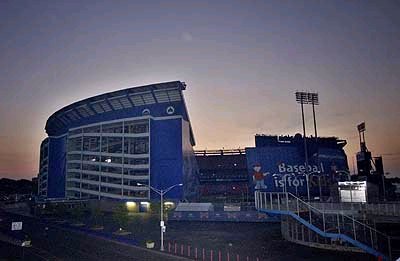
In other Blackout news, the Mets managed to avoid another home loss by having their game cancelled due to lack of power at Shea Stadium. And, also, the lights were out, and there was no electricity. Heh, heh . . . lack of power at Shea . . . what else is new?!